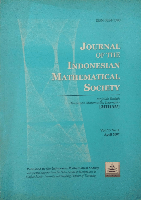
Journal of the Indonesian Mathematical Society
Scope & Guideline
Advancing Mathematical Knowledge, One Paper at a Time.
Introduction
Aims and Scopes
- Algebra and Number Theory:
The journal publishes research on various algebraic structures, including rings, fields, and modules, with a focus on derivations, homomorphisms, and algebraic properties. - Geometry and Topology:
Papers in this area explore geometric structures, including Riemannian and Lorentzian manifolds, as well as topological aspects of mathematical spaces. - Applied Mathematics and Mathematical Modeling:
The journal encourages submissions that apply mathematical theories to solve practical problems, particularly in finance, economics, and environmental studies. - Graph Theory and Combinatorics:
Research focusing on the properties of graphs, including domination, connectivity, and various graph indices, is a significant part of the journal's offerings. - Fuzzy Mathematics and Neutrosophic Logic:
The journal includes studies on fuzzy sets and neutrosophic logic, reflecting a growing interest in uncertainty and decision-making processes.
Trending and Emerging
- Financial Mathematics and Economic Modeling:
A noticeable increase in papers addressing financial models, such as microcredit systems and interest rate benchmarks, highlights a growing interest in applying mathematical techniques to economics. - Computational Mathematics and Simulation:
Recent articles emphasizing numerical methods, simulations, and algorithmic approaches suggest an emerging trend towards computational techniques in solving complex mathematical problems. - Interdisciplinary Applications of Mathematics:
Research that bridges mathematics with fields such as environmental science, engineering, and social sciences is on the rise, reflecting a trend towards interdisciplinary collaboration. - Advanced Topics in Graph Theory:
There is a significant increase in studies related to advanced graph theory concepts, including domination numbers and connectivity indices, indicating a deepening exploration of this area. - Fuzzy and Neutrosophic Mathematics:
An upward trend in research on fuzzy sets and neutrosophic logic suggests a growing recognition of the importance of these areas in handling uncertainty in mathematical modeling.
Declining or Waning
- Classical Analysis:
Research centered on classical analysis, such as traditional calculus and real analysis, appears to be less prominent in recent publications, possibly overshadowed by more modern approaches. - Purely Theoretical Constructs:
Themes focusing exclusively on abstract theoretical constructs without practical application have diminished, as the journal increasingly emphasizes applied mathematics. - Elementary Number Theory:
While foundational number theory remains relevant, the number of publications specifically addressing elementary aspects has decreased, suggesting a shift towards more complex or applied number theory. - Historical Mathematical Studies:
Papers exploring the history or philosophy of mathematics have become less frequent, indicating a potential decline in interest in this area within the journal's scope.
Similar Journals

TWMS Journal of Pure and Applied Mathematics
Advancing Mathematical Frontiers with IntegrityWelcome to the TWMS Journal of Pure and Applied Mathematics, a distinguished publication dedicated to advancing the field of mathematics through rigorous research and innovative applications. Published by the esteemed Institute of Applied Mathematics, this journal provides a platform for scholars and practitioners alike to share their findings and insights in both pure and applied mathematical disciplines. With a commitment to quality and integrity, the journal seeks to enhance the visibility and impact of mathematical research, reflected in its scholarly output. Although currently not an Open Access journal, the TWMS Journal aims to feature high-impact articles that contribute to both theoretical understanding and practical implementation. The journal’s address is located at Baku State University, ensuring its roots in a vibrant academic environment in Azerbaijan. As an essential resource in the mathematics community, the TWMS Journal of Pure and Applied Mathematics invites contributions that push the boundaries of knowledge and foster dialogue among researchers, professionals, and students.

European Journal of Pure and Applied Mathematics
Fostering Scholarly Dialogue in Mathematics and BeyondThe European Journal of Pure and Applied Mathematics, published by NEW YORK BUSINESS GLOBAL LLC, stands as a pivotal platform in the mathematical sciences, fostering the dissemination of significant research across various domains including algebra, applied mathematics, geometry, and theoretical computer science. Since embracing Open Access publishing in 2011, the journal enables unparalleled access to innovative findings and methodologies, making it an invaluable resource for researchers, professionals, and students alike. With a commendable Scopus ranking and a demonstrated impact within its categories—holding a Q3 position in several mathematical disciplines—the journal reflects a commitment to advancing knowledge and facilitating scholarly dialogue.
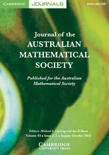
JOURNAL OF THE AUSTRALIAN MATHEMATICAL SOCIETY
Connecting researchers to the heart of mathematical discovery.JOURNAL OF THE AUSTRALIAN MATHEMATICAL SOCIETY, published by Cambridge University Press, is a prestigious journal dedicated to advancing research and scholarship in the field of mathematics. With a long-standing history since its inception in 1959, the journal has established itself as a vital resource for mathematicians, researchers, and students worldwide. Operating under an Open Access model, it ensures that high-quality research is accessible to all, enhancing the dissemination of knowledge and fostering collaboration in the mathematical community. The journal holds a commendable Q2 ranking in the 2023 Mathematics (miscellaneous) category and is ranked #145 in Scopus among general mathematics journals, placing it in the 63rd percentile, which reflects its significant influence and reputation in the discipline. The JOURNAL OF THE AUSTRALIAN MATHEMATICAL SOCIETY continues to provide a platform for innovative mathematical research and critical discourse within the field, making it an invaluable asset for professionals and aspiring mathematicians alike.

Publications de l Institut Mathematique-Beograd
Advancing mathematical discourse and innovation.Publications de l Institut Mathematique-Beograd is a distinguished journal in the field of mathematics, published by Publications L Institut Mathematique Matematicki in Serbia. With an ISSN of 0350-1302, it aims to disseminate high-quality research across various domains of mathematics, fostering academic discourse and innovation. Despite its open access status being unspecified, the journal is accessible to a wide audience, supporting an inclusive environment for knowledge sharing. The journal's impact is reflected in its 2023 category quartile ranking of Q3 in Mathematics (Miscellaneous), verifying its contribution to the mathematical community. With a Scopus ranking placing it in the 22nd percentile of general mathematics, it serves as a vital resource for researchers, professionals, and students eager to stay abreast of contemporary mathematical advancements. Since its convergence in 2002, and with ongoing publications continuing through 2024, this journal remains a crucial platform for sharing innovative mathematical ideas and results.
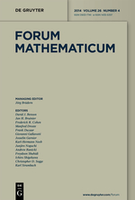
FORUM MATHEMATICUM
Connecting Ideas: A Hub for Mathematical ExcellenceFORUM MATHEMATICUM, published by WALTER DE GRUYTER GMBH, is a distinguished academic journal based in Germany, known for its significant contributions to the field of mathematics. With an ISSN of 0933-7741 and an E-ISSN of 1435-5337, the journal features comprehensive studies ranging from applied mathematics to diverse mathematical disciplines. Having maintained a commendable presence since 1989, FORUM MATHEMATICUM has achieved notable classification rankings, including Q2 in Applied Mathematics and Q1 in miscellaneous Mathematics as of 2023. Additionally, it holds a Scopus rank within the top 60th percentile in General Mathematics, making it a prominent platform for researchers and professionals seeking rigorous analysis and innovative methodologies in mathematics. While the journal does not currently offer open access, its rich content is pivotal for advancing mathematical theory and applications, appealing to students and seasoned academics alike.

Filomat
Pioneering Knowledge in Miscellaneous MathematicsFilomat is a distinguished academic journal published by the University of Niš, Faculty of Science and Mathematics, located in Serbia. Operating since 2010, the journal has carved a niche within the field of mathematics, particularly in miscellaneous mathematics, as evidenced by its recognition in the Q3 quartile for 2023. With an ISSN of 0354-5180, Filomat provides a platform for both researchers and academics to share insights and advancements across diverse mathematical disciplines, enhancing collaboration and knowledge sharing. Although the journal currently does not offer open access, its contributions are critical for those engaging with complex mathematical concepts and applications. Furthermore, with a Scopus rank of #223 out of 399 in the realm of General Mathematics, it stands as a credible source for high-quality research. The journal's objective is to promote a deeper understanding and application of mathematical theories, making it a vital resource for students, professionals, and researchers alike.

TRANSACTIONS OF THE AMERICAN MATHEMATICAL SOCIETY
Championing Excellence in Mathematical ResearchTRANSACTIONS OF THE AMERICAN MATHEMATICAL SOCIETY, published by the American Mathematical Society, is a premier journal in the field of mathematics that has been contributing to the advancement of mathematical knowledge since 1900. With an ISSN of 0002-9947 and an E-ISSN of 1088-6850, this journal holds a prestigious position in the academic landscape, evidenced by its Q1 rankings in both Applied Mathematics and Miscellaneous Mathematics categories as of 2023. With a Scopus ranking of #97 in General Mathematics and a percentile standing of 75th, the journal is recognized for its rigorous peer-review process and the quality of the research it publishes. Though it does not currently offer open access options, it essentially serves as a vital resource for researchers, professionals, and students seeking critical insights and developments in mathematical theory and applications. The Transactions aim to publish high-quality research articles that foster the exchange and dissemination of ideas, supporting the growth of both theoretical and applied mathematics within the global scholarly community.

INDIAN JOURNAL OF PURE & APPLIED MATHEMATICS
Exploring the Depths of Pure and Applied MathematicsINDIAN JOURNAL OF PURE & APPLIED MATHEMATICS, published by the INDIAN NATIONAL SCIENCE ACADEMY, stands as a vital resource in the realm of pure and applied mathematics since its inception in 1996. With ISSN 0019-5588 and E-ISSN 0975-7465, this journal aims to disseminate original research that advances the understanding and application of mathematical principles. Operating out of New Delhi, India, it serves a diverse readership comprising researchers, scholars, and practitioners in the mathematical sciences. Recognized within the Q3 category in both Applied Mathematics and Miscellaneous Mathematics as per the 2023 category quartiles, the journal emphasizes rigorous peer-reviewed articles that contribute to its impact in academia, reflected in its Scopus rankings. Although it does not currently operate as an open-access journal, it maintains a commitment to quality and accessibility of scholarly content, striving to foster academic collaboration and innovation. The convergence of full-text issues from 1996 to 2024 highlights its ongoing dedication to the evolution of mathematical research.
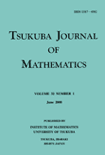
Tsukuba Journal of Mathematics
Cultivating a Community of Mathematical ExcellenceTsukuba Journal of Mathematics is a distinguished publication dedicated to advancing the field of mathematics through the dissemination of innovative research and comprehensive studies. Published by the University of Tsukuba, Department of Mathematics, this journal serves as a vital platform for mathematicians, researchers, and students to engage with cutting-edge mathematical theories and methodologies. Although currently not available as an open-access journal, it maintains a strong academic presence, contributing significantly to the global mathematical landscape. The journal invites submissions across various branches of mathematics, aiming to foster scholarly communication and collaboration. The ISSN 0387-4982 and the E-ISSN 2423-821X further establish its credibility and accessibility among the academic community, supporting its critical objective of facilitating high-quality research output. Situated in Tsukuba, Japan, a hub for scientific research and development, the Tsukuba Journal of Mathematics is committed to bridging gaps in mathematical knowledge and encouraging exploration of novel ideas.
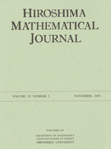
Hiroshima Mathematical Journal
A Legacy of Mathematical Research and DiscoveryThe Hiroshima Mathematical Journal, published by Hiroshima University, Graduate School of Science, serves as a prominent platform for disseminating high-quality research in the field of mathematics. Established in 1959, the journal has been an integral part of the mathematical community, focusing on areas such as Algebra, Number Theory, Analysis, and Geometry and Topology. Although currently classified in Q4 quartile rankings within its categories, the journal is committed to advancing mathematical knowledge and fostering scholarly dialogue. Its accessibility, combined with its long-standing history, makes it an essential resource for researchers, professionals, and students dedicated to exploring and enhancing the mathematical sciences. For those interested in contributing or accessing cutting-edge research, the Hiroshima Mathematical Journal continues to uphold its mission of excellence in mathematical scholarship.